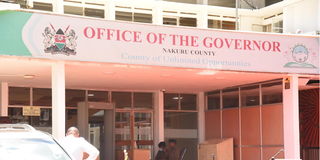Finance CEC defends drop in county's own source revenue collection

The office of the governor in Nakuru city.
A transition in revenue collection strategies is the cause for the drop in Nakuru's own source revenue in the first quarter of the financial year 2024/2025.
The Nakuru county government has moved to clarify the reason for its failure to meet its own source revenue targets in the last three months as revealed by the controller of budget (CoB).
The CoB in her report found that Nakuru county raised Sh 600.9 million as of September 30, which was a drop of 11 percent from last year's collection of Sh 676 million for the similar period.
Own-source revenue (OSR) refers to the income that county governments generate independently, typically through local taxes, fees, fines, and service charges.
According to Kenya's Constitution (2010), counties are responsible for generating revenue through property taxes, entertainment taxes, and charges for services provided, among other sources.
The highest revenue stream, Sh 71.89 million, was from Cess, contributing 12 per cent of the total OSR receipts during the reporting period followed by the parking fees Sh 60 million contributing 10 percent.
Revenues from health which also included the Facility Improvement Funds (FIF) contributed 59 percent.
The County Executive member for Finance Mr Stephen Iribe Njogu defended the collection which he said resulted from the changes in the strategies.
Among the strategies he outlined include the unified trade licenses which forced traders to obtain a single permit for their businesses.
According to Mr Iribe, some traders took time to come on board, thus delaying the payment of the revenue.
He also indicated that the county introduced a cashless payment system which was still being adopted by the residents.
The county official indicated that the county had also embarked on enhancing its database for the tax payers in order to be able to identify its revenue collection as well as set their targets.
“We first had to enhance our database to bring everyone on board so that we can be able to assess the potential of our revenue collections and give ourselves realistic targets. We realized that we had traders who were evading tax payments and thus we needed to bring them on board. Other measures such as unified taxes for businesses such as hotels and liquor licenses also slowed the collections,” said Mr iribe.
He indicated that they began by boarding sub counties beginning with major revenue potentials such as Nakuru East, West and Naivasha which they had given a target.
The CEC noted that based on their assessment, the two sub counties have already met their targets thus exhibiting confidence that the strategies are working.
He further explained that they are waiting to see the county’s performance in the second and third quarter (December to March which he said is the county’s main revenue collection season.
